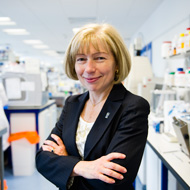
Anna Dominiczak has been recognised for her cardiovascular work
One of the world's most eminent cardiovascular scientists has been recognised with a Damehood for her contributions to cardiovascular and medical science.
Professor Anna Dominiczak is vice-principal and head of the College of Medical, Veterinary and Life Sciences at the University of Glasgow.
She commented on being recognised in the Queen's Birthday Honours List: "I am extremely proud to receive this honour and consider it also a recognition of the work of many dedicated, talented and inspiring colleagues at the University of Glasgow. Their support has been invaluable.
"It is indeed an honour for me to lead the work of the College of Medical, Veterinary and Life Sciences which excels across so many areas and it is my hope that we can continue to positively transform the outcomes of so many people with cardiovascular and other chronic diseases."
Professor Dominiczak, who graduated from the Medical School in Gdansk, Poland, works to identify genetic factors that may predispose people to heart disease and stroke. She has authored nearly 400 research publications and is editor-in-chief of the leading journal Hypertension.
As well as her academic work, she is also an honorary consultant physician and non-executive director of the NHS Greater Glasgow and Clyde Health Board.
She was also a key force in making Scotland a global leader in precision medicine and has led the academic developments at Queen Elizabeth University Hospital in Glasgow, which will generate advanced new treatments for chronic diseases.
Image courtesy of the University of Glasgow



 The latest
The latest